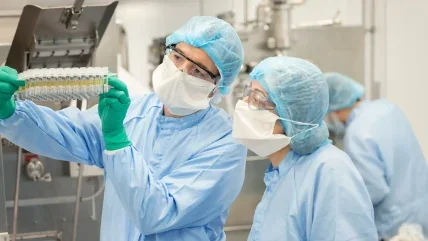
British vaccine maker GSK and Germany-based CureVac have extended their existing collaboration into a new licensing agreement to focus on their mRNA development activities.
The two vaccine makers have been working together since 2020 to develop mRNA-based vaccines for infectious diseases, based on CureVac’s unique mRNA technology.
Currently, their vaccine candidates for seasonal influenza and Covid-19 are in Phase 2 and avian influenza is in Phase 1 clinical development.
Under the new licensing agreement, GSK will be responsible for developing and manufacturing vaccine candidates and will have the right to commercialise them worldwide.
In exchange, CureVac will receive an upfront payment of €400m and additional payments up to €1.05bn in development, regulatory and sales milestones and tiered royalties.
The new agreement replaces all previous financial considerations between GSK and CureVac, from their previous collaboration agreement.
Its closing is subject to certain customary closing conditions, antitrust and regulatory approvals.
GSK chief scientific officer Tony Wood said: “We are excited about our flu/Covid-19 programmes and the opportunity to develop best-in-class mRNA vaccines to change the standard of care.
“With this new agreement, we will apply GSK’s capabilities, partnerships and intellectual property to CureVac’s technology, to deliver these promising vaccines at pace.”
CureVac CEO Alexander Zehnder said: “The collaboration with GSK has been instrumental in developing promising, late clinical-stage vaccine candidates, leveraging our proprietary mRNA platform.
“This new licensing agreement puts us in a strong financial position and enables us to focus on efforts in building a strong R&D pipeline.”
Upon closing, CureVac will retain exclusive rights to the additional undisclosed and preclinical-stage infectious disease targets from the previous collaboration.
Also, the German vaccine maker can independently develop and partner mRNA vaccines in any other infectious disease or other indication.
GSK said that the new licensing agreement represents the latest step in its ongoing investment in vaccine platform technologies, to develop advanced vaccines.
In a separate development, CureVac announced a strategic restructuring to focus on high-value mRNA projects in oncology and other select areas of substantial unmet medical need.
As part of the restructuring, the company is reducing its workforce by around 30%, to create a more agile organisation re-focused on technology innovation, research and development.
CureVac expects data from the Phase 1 study of its cancer vaccine candidate CVGBM in glioblastoma, in the second half of this year.
The company would have two shared-antigen cancer vaccines in solid tumour and haematological cancers by the end of 2025, with plans to begin Phase 1 studies in 2026.
CureVac CEO Alexander Zehnder said: “The new GSK agreement not only provides substantial financing but also allows us to streamline our operations and focus on technology innovation, research, and development.
“It enables us to prioritise our oncology programs and further leverage our technology in other areas where mRNA is uniquely suited to develop novel treatment approaches.
“While the approximately 30% workforce reduction is a difficult decision on a personal level, I am convinced that this is a necessary step to ensure the long-term success of CureVac.
“As we implement this change, we are grateful to all our employees for their dedication, passion and commitment in advancing mRNA-based therapies to patients.”






